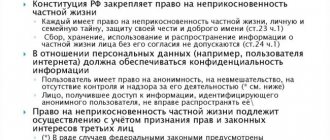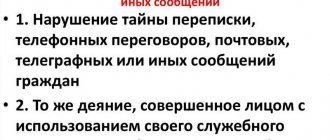New edition of Art. 137 of the Criminal Code of the Russian Federation
1. Illegal collection or dissemination of information about the private life of a person, constituting his personal or family secret, without his consent, or dissemination of this information in a public speech, publicly displayed work or the media -
shall be punishable by a fine in the amount of up to two hundred thousand rubles, or in the amount of the wages or other income of the convicted person for a period of up to eighteen months, or by compulsory labor for a term of up to three hundred sixty hours, or by corrective labor for a term of up to one year, or by forced labor for a term of up to two years. with deprivation of the right to hold certain positions or engage in certain activities for a term of up to three years or without it, or arrest for a term of up to four months, or imprisonment for a term of up to two years with deprivation of the right to hold certain positions or engage in certain activities for a term of up to three years .
2. The same acts committed by a person using his official position, -
shall be punishable by a fine in the amount of one hundred thousand to three hundred thousand rubles, or in the amount of the wages or other income of the convicted person for a period of one to two years, or by deprivation of the right to hold certain positions or engage in certain activities for a period of two to five years, or by forced labor. for a term of up to four years with deprivation of the right to hold certain positions or engage in certain activities for a term of up to five years or without it, or arrest for a term of up to six months, or imprisonment for a term of up to four years with deprivation of the right to hold certain positions or engage in certain activities for a period of up to five years.
3. Illegal dissemination in a public speech, publicly displayed work, mass media or information and telecommunication networks of information indicating the identity of a minor victim under sixteen years of age in a criminal case, or information containing a description of the physical or physical persons received by him in connection with the crime moral suffering, resulting in harm to the health of a minor, or mental disorder of a minor, or other grave consequences -
shall be punishable by a fine in the amount of one hundred fifty thousand to three hundred fifty thousand rubles, or in the amount of the wages or other income of the convicted person for a period of eighteen months to three years, or by deprivation of the right to hold certain positions or engage in certain activities for a period of three to five years, or forced labor for a term of up to five years with or without deprivation of the right to hold certain positions or engage in certain activities for a term of up to six years, or arrest for a term of up to six months, or imprisonment for a term of up to five years with deprivation of the right to hold certain positions or engage in certain activities certain activities for a period of up to six years.
What is meant by invasion of privacy?
The Criminal Code treats the collection of personal and family information illegally, as well as its public dissemination, as an invasion of privacy. Also, the private life of citizens is protected by the Civil Code. Article 152.2 specifies a direct prohibition on the receipt and use of personal data, including place of residence, marital status and other personal information. Within the framework of civil law, citizens can, on the basis of Article 150 of the Civil Code of the Russian Federation, demand the protection of intangible benefits.
In addition, Federal Law No. 152 “On the Protection of Personal Data” sets the main goal of protecting human rights and freedoms in the field of privacy, personal and family secrets, when transferring this information to third parties.
Part 2 Art. 137 of the Criminal Code of the Russian Federation
The qualifying feature of the crime under consideration is its commission by a person using his official position .
To have a qualified crime (Part 2 of Article 137 of the Criminal Code of the Russian Federation), a special subject . It is any person who illegally collects or disseminates information about the private life of a person using his official position.
The actions of officials may, if there are grounds for this, be qualified in conjunction with the elements of an official crime.
When deciding whether the crime in question exists, one should proceed from the need to ensure a balance between the right of citizens to protect honor, dignity, and business reputation, on the one hand, and other rights and freedoms guaranteed by the Constitution - freedom of thought, speech, mass media, the right to freely search, receive, transmit, produce and distribute information in any legal way, the right to privacy, personal and family secrets, the right to appeal to state bodies and local governments (Articles 23, 29, 33 of the Constitution), on the other.
Types of invasion of privacy
Invasion of privacy is considered by the Criminal Code to be the collection and storage of information about a citizen’s identity.
Note!
Article 152.2 of the Civil Code means by private life information about origin, place of stay, residence, personal and family life.
Also, Article 152.1 of the Civil Code of the Russian Federation protects images of citizens: the use and publication of photographs, videos and works of art in which a citizen is depicted is possible only with consent.
Second commentary to Art. 137 of the Criminal Code of the Russian Federation
1. The object of the crime is the right of everyone to privacy, personal and family secrets, proclaimed in Part 1 of Art. 23 and part 1 art. 24 of the Constitution of the Russian Federation.
2. The objective side of the crime provided for in Part 1 of Article 137 of the Criminal Code of the Russian Federation consists of two types of actions: a) illegal collection or dissemination of information about the private life of a person, constituting his personal or family secret, without his consent, or b) dissemination of this information in a public speech, publicly displayed work or media. In accordance with Federal Law No. 152-FZ of July 27, 2006 “On Personal Data,” information about a person’s private life is a component of personal data. This includes any information relating to a specific individual, including, for example, last name, first name, patronymic, year, month, date and place of birth, address, family, social, property status, education, profession, income.
The dissemination of personal data refers to actions aimed at transferring personal data to a certain circle of persons or to familiarize with the personal data of an unlimited number of persons, including the publication of personal data in the media, posting in information and telecommunication networks or providing access to personal data to some or in another way. The use of personal data refers to actions (operations) with personal data performed for the purpose of making decisions or performing other actions that give rise to legal consequences in relation to the subject of personal data or other persons or otherwise affect the rights and freedoms of the subject of personal data or other persons.
3. A secret is, first of all, information or information of a certain content. Thus, the Law of the Russian Federation of July 21, 1993 “On State Secrets” (as amended) classifies as state secrets information protected by the state in the field of its military, foreign policy, economic, intelligence and operational-search activities. A trade secret is defined in law as information used in business activities (Federal Law of July 29, 2004 No. 98-FZ “On Trade Secrets”). In accordance with Art. 2 of the Federal Law of July 27, 2006 No. 149-FZ “On information, information technologies and information protection”, information means information (messages, data) regardless of the form of their presentation.
A secret is not any information (information), but only that which is known to a certain circle of people or even a specific person. Common to all types of information (information) that constitute a secret is the restriction of access to it by virtue of legal requirements.
4. In Art. 137 of the Criminal Code talks about privacy. Its content is quite broad and varied. However, the criminal law does not protect any information (information) about private life, but only those that constitute personal and family secrets. Personal and family secrets consist of a variety of information about personal or family life. The specified information may be the subject of professional secrets: medical, judicial, lawyer, preliminary investigation, notarial actions, monetary deposits, confession, protected by law.
The crime is completed from the moment the actions specified in Part 1 of Article 137 of the Criminal Code are committed.
5. The subject of a crime under Part 1 of Art. 137 of the Criminal Code is a private person who has reached the age of 16.
6. Subjective side - guilt in the form of direct intent.
7. Part 2 of the article in question provides for liability for violation of privacy committed by a person using his official position, i.e. the subject of this crime is an official or a person performing managerial functions in a commercial or other organization or another employee (of a local government body, a commercial or non-profit organization).
Invasion of personal affairs
The Federal Law “On Personal Data” defines personal information as any information relating directly to information relating to a directly or indirectly identified and identifiable person.
Obtaining information about the name, date, place of birth, marital status, address, availability of property, level of education and profession is possible only with the consent of the citizen or by court decision. In other cases, gaining access to this data is considered an intrusion into personal affairs.
Note!
Roskomnadzor clarified that the amount of a citizen’s salary and income is personal information and is protected by law.
What is the article for interference in family life by a third party, since it destroys...
What exactly do you mean by invasion of privacy?
There are 3 main types of invasion of privacy:
Invasion of personal affairs
This type of interference in private life involves prosecution even without disclosure of personal data to other persons (Articles 137, 138 of the Criminal Code). In particular, this type of invasion can include
•Staying on a person’s private property without his consent and refusing to leave it (Article 139 of the Criminal Code);
•Tracking a person, including photo and video recording, carried out using hidden cameras
Assigning a name or appearance
This type of intrusion is typical for advertising companies. Some organizations, when advertising one or another of their products, use the name or photographs of celebrities to attract buyers. If such actions are carried out without the consent of the person whose name or appearance is used, this is a crime under Article 137 of the Criminal Code.
Dissemination of information about private life
Responsibility arises for the disclosure of personal data about a citizen’s personal life that has become known to another person for any reason. For example, a woman invited a cameraman to photograph childbirth in order to leave this recording in her personal family archive, which the cameraman knew about. If the latter makes the recording public in any way, for example, by posting it on his page on social networks, his behavior can be regarded as an invasion of privacy under Article 137 of the Criminal Code.
Violation of the confidentiality of correspondence and other communications
The law establishes a special procedure for familiarizing with personal correspondence and telephone conversations of citizens. In particular, without a person’s knowledge, one can listen to his conversations and view correspondence only by a court decision or with the sanction of a prosecutor. If another person violates these rules, he commits a crime under Article 138 of the Criminal Code of the Russian Federation.
A criminal who gains access to personal correspondence or telephone conversations of another person, using his official position, will be liable under Part 2 of Article 138, which provides:
•Fine from 100 to 300 thousand;
•Deprivation of the right to carry out certain work for a period of 2 to 5 years;
•Compulsory work of 480 hours or less;
•Forced labor;
•Arrest for 4 months;
•Imprisonment for up to 4 years.
In addition, the Criminal Code of the Russian Federation contains a separate article if penetration into personal life was carried out using illegally acquired special technical means intended for secretly obtaining information. If the violator used them to collect information, then he will also be liable under Article 138.1.
Call
Did the answer help you? Yes No
Assigning a name or appearance
According to Article 19 of the Civil Code, the acquisition of rights and the performance of obligations is carried out under one’s own name.
In addition, according to the Civil Code, Russians have the right to a pseudonym and change their name. Paragraph 4 of Article 19 of the Civil Code of the Russian Federation outlines a ban on acquiring rights under someone else’s name. Moreover, in the second paragraph of this paragraph, the legislator allows the use of a citizen’s name with his consent for creative and entrepreneurial activities, if this does not mislead third parties.
Illegal use of a first and last name is subject to legal protection under Article No. 152 “On the Protection of Honor, Dignity and Business Reputation” and Article No. 151 “Compensation for Moral Damage”
Dissemination of information about private life
This is understood as the publication in the public space, as well as the use in the press or on the Internet, of information about a person without his consent.
Part 3 of norm 137 of the Criminal Code provides for punishment for the publication of information about the identity of a victim in a criminal offense under the age of 16 years.
Mention in the public space of descriptions of the suffering of a minor who has suffered during the commission of a criminal offense entails a financial penalty in favor of the state in the amount of 150 thousand to 300 thousand rubles or the total income of the perpetrator for three years.
Also, a person convicted of violating this provision of the law may be deprived of the opportunity to engage in certain professional activities or be required to perform forced labor for five years. The most severe punishment for disseminating information about private life can be arrest for six months or imprisonment for five years.
Note!
Based on part 4 of norm 152.2 of the Civil Code, citizens have the right to petition the court to delete or confiscate video recordings and other documents containing data about their personal lives.
Data about a citizen’s personal life obtained as part of investigative actions is also protected. According to the Federal Law “On Police,” law enforcement officers may request additional information to identify a citizen, including from medical institutions. The transfer of this information, in accordance with Part 6 of Article 5 of the Law, cannot be transferred to third parties without the consent of the citizen, with the exception of situations of initiation of criminal and administrative cases, when documents are transferred to the investigative authorities and the court.
Commentary on Article 137 of the Criminal Code of the Russian Federation
1. The subject of the crime is information about the private life of a person that constitutes his personal or family secret. The content of such information may be different: it may relate to a person’s past activities, habits, physical disabilities, sexual orientation, spiritual life, family and intimate relationships, property and professional status, etc.
Data carriers can be documents, photographs, things, etc. They must contain information about the person's private life. Private life consists of those aspects of a person’s life that, due to his freedom, he does not want to make available to others.
2. The objective side of the crime is characterized by alternative actions:
1) illegal collection of information without the consent of the person;
2) their illegal distribution without the consent of the person;
3) their dissemination in a public speech, publicly displayed work or the media.
Collecting is, for example, observing, eavesdropping, interviewing people, stealing, copying, photographing documents or other media. Dissemination consists of actions aimed at transmitting information about a person’s private life to a certain circle of people or making this information available to an unlimited number of people.
Collecting and disseminating information about a person’s private life must be illegal, i.e. be carried out in violation of the procedure established by law for third-party collection and disclosure of the specified information.
Dissemination of information about the private life of a person in a public speech, publicly displayed work or the media involves bringing this information to a large number of people.
3. The crime is considered completed from the moment of collecting or disseminating information about the private life of a person without his consent.
4. The subjective side of the crime is characterized by direct intent.
5. The subject of the crime is a person who has reached the age of 16 years. A person who was previously entrusted by the victim with a personal or family secret and who subsequently disclosed it without the latter’s consent (for example, a spouse) may also be guilty of a crime.
6. A qualifying feature (Part 2 of Article 137) is the commission of a crime by a person using his official position (doctor, teacher, lawyer, investigator, judge, etc.).
Violation of the confidentiality of correspondence and other communications
The Criminal Code protects correspondence, telephone conversations, postal, telegraph and other messages. Violation of this secret on the basis of Article 138 of the Criminal Code of the Russian Federation threatens with a material penalty in favor of the state of up to 80 thousand rubles, compulsory or corrective labor. Violation of the inviolability of the home is also subject to criminal liability.
Restriction of the right to privacy of correspondence, telephone conversations and other methods of exchanging information is possible on the basis of Article 13 of the Criminal Procedure Code only if there is an appropriate court decision.
When there is no punishment
According to norm 20 of the Criminal Code, punishment is not provided for violating the secrets of private and family life in cases where the person who committed this crime has not reached the age of 16 years.
Note!
The Civil Code, in the second paragraph of part 1 of norm 152.2, removes liability for violation of privacy and the dissemination of personal information in state or public interests.
According to the Supreme Court Resolution No. 16 of 2010, paragraph 25, in judicial practice a distinction should be made when publishing information in the media about the private life of officials, when it has a positive effect on public discussion, and publishing information in the press about the private life of citizens, not engaged in public activities.
When considering cases involving the publication in the media of details of the personal lives of public and government figures, the court is guided by the principle of journalists fulfilling their public duty.
Part 3 Art. 137 of the Criminal Code of the Russian Federation
Part 3 of Article 137 of the Criminal Code of the Russian Federation establishes increased criminal liability for the illegal dissemination in a public speech, publicly displayed work, media or information and telecommunication networks of information indicating the identity of a minor victim under 16 years of age in a criminal case or information containing a description physical or moral suffering received by him in connection with the crime, resulting in harm to the health of a minor or mental disorder of a minor, or other grave consequences.
The objective side of this crime consists in the public dissemination of information about a minor under 16 years of age related to a criminal case and containing a description of the suffering and torment of the minor in connection with this. A mandatory sign of the objective side of this crime is the occurrence of consequences in the form of harm to the health of a minor or his mental disorder, or other serious consequences (for example, attempted suicide).
The subjective side presupposes the presence of two forms of guilt: intent in relation to actions and carelessness in relation to consequences. At the same time, the consciousness of the perpetrator must include that the information concerns a minor under 16 years of age.
The subject of the crime is general - a sane individual who has reached the age of 16 at the time of the commission of the crime (Part 2 of Article 20 of the Criminal Code of the Russian Federation).
Criminal article for violation of personal space
Criminal article for violation of personal space and inviolability of home. Responsibility for violating the inviolability of a citizen’s place of residence is provided for by norm 139 of the Criminal Code.
Note!
Entering a house against the owner’s wishes is punishable by a financial penalty in favor of the state of 40 thousand rubles or compulsory work for 360 hours.
If the violation of personal space occurred with the use of violence or with the use of official position, the punishment is increased. The court may sentence those guilty of committing these actions to a fine of 300 thousand rubles or imprisonment for a period of up to 3 years. Persons who have committed illegal entry into a home using their official position may also be deprived of the right to engage in certain professional activities by court decisions.
Commentary to Art. 137 Criminal Code
1. The subject of the crime is information about the private life of a person that constitutes his personal or family secret. Data carriers can be documents, things, information on magnetic media, as well as the person himself. The mandatory requirement imposed on these media by law is that they must contain information that constitutes a personal or family secret of a person, i.e. subjectively classified by a person as hidden from outsiders, data relating to an individual and his connections in society, which has not previously been disclosed in public and is of either a defamatory or not character.
2. The objective side of the crime is characterized by alternatively provided actions.
Collecting should be understood as the purposeful search for information about the private life of a person, regardless of the method of finding (for example, through observation, eavesdropping, questioning, stealing documents or other media, etc.). When collecting, an ideal combination of crimes provided for in Art. 137 of the Criminal Code and Art. 138, 139 or 272 of the Criminal Code.
Distribution is the communication of information about a person’s private life to a third party by any means (orally, in writing or using information technology). When distributing, the person about whom certain information is reported must be individually specified to the extent of his recognition by a third party.
Dissemination of information about the private life of a person in a public speech, publicly displayed work or the media involves bringing this information to an unlimited number of persons.
3. The crime is considered completed from the moment the specified actions are committed, regardless of whether the person received the required information or whether it reached a third party.
4. A person who was previously entrusted by the victim with a personal or family secret and who subsequently disclosed it without the latter’s consent (for example, a spouse) may also be guilty of a crime.
5. Part 3 establishes liability for an independent crime: illegal dissemination of information indicating the identity of a minor victim under 16 years of age in a criminal case, or information containing a description of the physical or mental suffering he received in connection with the crime. The sign of illegality in this case is associated with the prohibition in Part 3 of Art. 161 of the Code of Criminal Procedure of the Russian Federation discloses data on the private life of a minor victim under the age of 14 years, without the consent of his legal representative, but is expanded in the criminal law itself by increasing the age of persons in connection with whom the ban is established. The crime involves, alternatively, causing harm to the health of a minor, or mental disorder of a minor, or other grave consequences and can be characterized by both intent and negligence.





